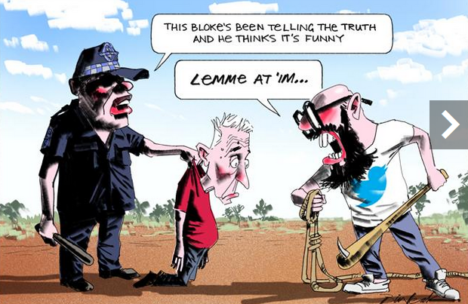Bill Leak takes aim at ‘tantrum throwing Tweety Birds’ in robust defence of The Australia cartoon
Under fire cartoonist Bill Leak has defended his controversial cartoon in yesterday’s Australian, and drawn a cartoon portraying himself as the victim of “tantrum throwing” and “sanctimonious Tweety Birds”.
Leak, and his employers, faced widespread criticism of yesterday’s cartoon which appeared to suggest indigenous fathers do not know the names of their own children.
Writing in today’s Australian, Leak mounted a defense of his work, branding those who attacked the cartoon as “racist” as suffering from what he called “Chronic Truth Aversion Disorder”.



This is one of the most sensible articles I have read in over 10 years. Please continue to stand up to the social media bullies who probably represent less than 0.001% of ordinary people. (Yes that is 1 in 100,000). I am sure our indigenous brothers who actually care about the future of their people will agree with the points being made.
Statistics involving the Aboriginal community are an ugly indictment on Australia. I think these provocative cartoons/reports are great because they stimulate discussion and can correct misunderstandings. If absent un-engaged fathers are not a problem in the Aboriginal community then people can dispute that, if it is we can ask what is being done or challenge why it is being ignored. I think a role of the media is to stimulate debate, not stifle or control it.
As a great commentator observed about 50 years ago there is no fascism on earth that could compare with the fascism of the Left.
He would be happy (in one sense) that his words are still vindicated. But, on the other hand, like all fair-minded Australians, he’d be appalled how almost totally they have captured the media and those little pockets still free must to be destroyed. Once again the Left proves it will not brook any opposition. Never has, never will.
Leak chose to draw in a style which invokes some of the worst political cartooning iconography of the 20th century. Der Sturmer would be proud of his use of ‘teltale’ racial tropes around the lips, and hair.
Leak has form for doing this: His stories about Rudd and China abounded with classic ‘the bulletin’ yellow peril era slitty eyes. If he goes after ISIS or problems in the middle east, its noses. When its chinese people he goes for the buck teeth.
Downer, it was not about his race, it was his fishnets. Howard, it wasn’t about his race, it was his eyebrows. Abbot, it wasn’t about his race, it was his budgie smugglers. But if you get Leak onto any racially profiled story, he falls back on the same things “the elders of Zion” used, and then some. Give me a break.
I call bullshit on his “its the truth” angle: he’s not a words man, he is using visuals which betray a solid genetic-racist angle on how to get his story across.
This must be one of the best op-ed pieces I have had the pleasure to read this year. Political correctness is killing us all and Bill reveals how juvenile and stupid the Tweety Birds really are. The problem is that they are everywhere now, they are uneducated, uninformed, unthinking and lash out like 5 year olds in Woolies when they cannot get mommy to buy the lollies.
Bill Leak and Paul Whittaker surely don’t really believe this cartoon is ‘intelligent’, do they? Do they!?!
A message to Bill – don’t let the turkeys get you down! The power of the cartoon is sometimes mightier than the written word because it has to be succinct. It is sad to see how far off the mark the critics are; some deliberately obfuscating in their comments while others just don’t get it.
Consider why kids have repeatedly attacked school teachers in North Queensland, why kids in the Northern Territory have been incarcerated multiple times, why they don’t attend school, why they abuse illicit substances and it all comes down to DEADBEAT PARENTS. Of course it has to be said loudly and clearly. So Bill, please ignore the PC Police, the loony left and raft of sad do-gooders and carry on your work. It really is that important.
I 61 years old and i know that for at least 61 years both white fella and black fella and everyone in between has been trying to make things better for our idigineous folk … but alas not much has seemed to work .. especially improving the lot of the young. If this cartoon cuts too close to the bone for some then fantastic. Trust me it cannot do any harm .
A problem won’t be solved if you refuse to recognise it exists. The PC brigade don’t want to acknowledge the problem of the yawning cultural chasm that separates aborigines from other Australians.
The cartoon may be insensitive but it highlights a problem, well, at least one of the symptoms of the problem. And the problem is the policeman, representing white Australia, telling the aborigines that THEY have a problem, THEY have to fix it, and it’s not up to Whitey to help fix it.
My parents had a wonderful way of dismissing the PC within our society, using the often heard phrase, “You can’t legislate against stupid, my dear.” Until recently I thought that somewhat unfair but as I age I see more clearly how correct that supposition has become. In addition, I find that plain ignorance has its difficulties as well. Bless, intelligent cartooning into the future.
Leak says he is speaking “truth”. This is supposed to justify his stereotyping of aboriginal people as uncaring parents.
Worse, he does so in the context of young people abused at the hands of state employees whose job it is to provide custody.
Obviously the echo chamber in which Leak lives accepts a very low threshold for its heroics.